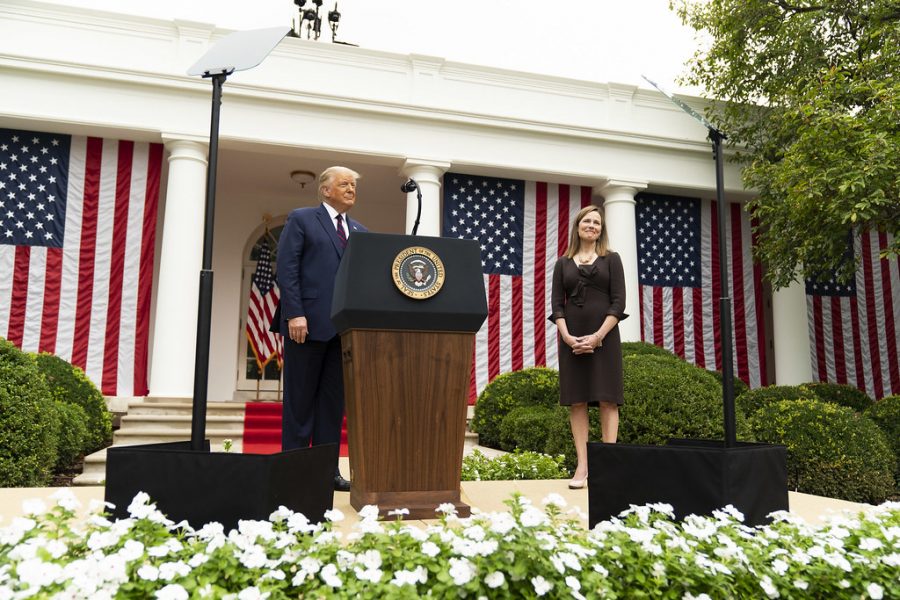Amy Coney Barrett
What you should know about President Trump’s Supreme Court pick
President Trump with his Supreme Court Justice pick, Amy Coney Barret, who will replace the late Justice, Ruth Bader Ginsburg.
On Saturday, September 26th, President Trump announced that the United States Court of Appeals Judge, Amy Coney Barrett, would be his pick for the replacement of the late Supreme Court Justice, Ruth Bader Ginsburg. With many of us still mourning the death of Ginsburg, a feminist icon and only the second woman to serve on the Supreme Court, we’re left wondering if this replacement will live up to Ginsberg’s legacy. Barrett was born in New Orleans in 1972. She received her B.A. in English literature from Rhodes College and her J.D. from Notre Dame, graduating with honors from both. After receiving a degree from the Notre Dame law school, she joined the faculty, continuing to teach from 2002 until getting a job on the United States Court of Appeals for the 7th Circuit. She was published in several journals, including the Columbia, Virginia and Texas Review. Though Barret served as a law clerk under Justice Antonin Scalia, she is likely to continue her conservative rulings trend rather than Justice Scalia, who occasionally ruled more liberally.
Judge Barrett has ruled following her conservative values on topics such as; abortion, gun rights, discrimination and immigration. Many of her rulings are based on her religion, at one point contributing to an article that stated Catholic judges should, in some cases, recuse themselves on some death penalty cases because of their religions. Some more notable of these conservative rulings are on the subject of abortion. Many are worried that if she is put on the supreme court, Roe V. Wade would be overturned by the majority Republican judges, restricting abortion rights for the whole country. Though she has never stated that she would be in support of overturning this ruling, Barret has considered three laws in Indiana that would restrict access to abortions. She was outspoken about supporting a law increasing requirements for notifying parents of minors who seek abortions; However, this ruling did not succeed; it shows an important part of her history and if placed on the supreme court, she would likely continue to tighten restrictions on abortions, if not outlaw them completely. On top of these abortion rulings, Barrett has a history of opposing gun control, at one point writing a dissent where she stated that convicted felons should still be allowed to own guns, as long as their crime was non-violent. Her opinions on immigration are unsurprisingly conservative, arguing in June that officials should be allowed to deny green cards to immigrants who are likely to seek public assistance. It was expected that Trump would choose a conservative judge to replace Ruth Bader Ginsberg. Still, if Barrett ends up being instated, there is a chance the conservative majority Supreme Court could change a lot about this country and abortion rights, gun control and immigrant rights could become a thing of the past.

Selah is a BHS senior who enjoys writing and wants to continue improving her skills by joining the OWL. She hopes to bring to light to important issues in and beyond the Boulder High community and share some of her many opinions. When she’s not doing work for her classes, Selah enjoys nature. She grows many plants, including purple grapes in her backyard, which she far prefers to the green ones. She spends a lot of time hiking, camping, and enjoying the Colorado mountains. Selah likes to read. She often reads fiction; however, philosophy and nonfiction are also her favorites. She is also a singer and piano player and has written several songs of her own and many in collaboration with her brother....


